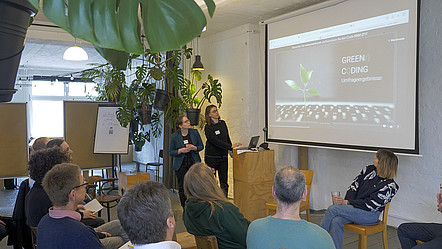It’s a wrap: Final insights from the 'Potentials of Green Coding' project
"Potentials of Green Coding" is coming to an end: Over the past 18 months, the project team has been researching and advocating for environmentally friendly software engineering practices. As the initial funding phase draws to a close, it's worth reflecting on some noteworthy insights and findings.
"Potentials of Green Coding" is coming to an end: Over the past 18 months, the project team has been researching and advocating for environmentally friendly software engineering practices. As the initial funding phase draws to a close, it's worth reflecting on some noteworthy insights and findings.
The researchers at Environmental Campus Birkenfeld conducted a literature analysis to assess the current state of Green Coding and Green IT. Their analysis revealed a robust conceptual foundation and ongoing research, with various methods for collecting resource- and energy-consumption data. However, a lack of unified terminology—seen in overlapping terms like Green ICT, IT, Computing, and Software Engineering—poses challenges in identifying relevant literature and connecting technologies to Green Coding. The findings of the literature analysis were presented at the Workshop "Environmental Informatics between sustainability and change" (Umweltinformatik zwischen Nachhaltigkeit und Wandel) during the INFORMATIK2023 and are published in the conference proceedings: https://dl.gi.de/search?query=Green%20Coding%20&scope=30690b3e-d866-4c83-8b80-3bfc9fa47f2c.
The project team at the German Informatics Society investigated the integration of eco-friendly software engineering in the internet industry through an online survey with 90 participants from ten countries, predominantly from Germany (79%). Results showed a consensus on the potential for sustainability improvement (75%) and half of the surveyed companies consider green coding a strategic goal. However, a mere 18% measure their software's ecological impact, and only 16% use green coding techniques to reduce energy and resource consumption. Identified barriers include the lack of clear strategies (54%), expertise (46%), and resources (36%). The subsequent industry workshop in Berlin, attended by major companies like Google, adesso, and DATEV, highlighted the criticality of accurate measurement and data in eco-friendly software development. It emphasized the need for standardized measurement units and addressed challenges like the absence of regulatory standards and insufficient political commitment. To promote sustainable software, engaging policy makers and advocacy groups is recommended to elevate awareness and establish regulatory frameworks akin to those for hardware sustainability. The findings from the survey and workshop can be found in the Potentials of Green Coding: Perspectives on implementation publication: https://gi.de/fileadmin/user_upload/ISOC/2023-09-25_Green_Coding_final.pdf
The project's educational division, based at University of Applied Sciences Berlin, showcased promising results by integrating green coding concepts into study programs. Recognized positively by students and faculty, the initiative raised awareness about sustainable software development. However, gaps in providing practical guidance in the Internet industry were identified, urging the need for step-by-step knowledge dissemination. The results are published in the INFORMATIK2023 conference proceedings: https://dl.gi.de/search?query=Green%20Coding%20&scope=30690b3e-d866-4c83-8b80-3bfc9fa47f2c.
More articles on this topic are set to appear in the EnviroInfo 2023 proceedings, so stay tuned for more! We extend our gratitude to the ISOC Foundation for their funding support for this project.
 © Andreas Plata - Gesellschaft für Informatik e.V.
© Andreas Plata - Gesellschaft für Informatik e.V.
